Lessons from the Road
7 Theaters, 17 Military Bases, 8 Hospitals, and 4 Conferences Later, How a Girl Fell in Love with Touring
In October of 2010, we were in tech for ReEntry at Baltimore’s CENTERSTAGE when I got the great news that American Records and ReEntry would be one of six participants in the New England Foundation for the Arts (NEFA) National Theater Touring Pilot. ReEntry was written by Emily Ackerman and me, based on interviews with Marines returning from Iraq and Afghanistan, which got its start at Two River Theater Company, commissioned by Aaron Posner. As the CEO of American Records (a theatre company devoted to making work that chronicles our time), I had begun producing the play at military hospitals and conferences, but on a case-by-case basis. The funding from NEFA would allow me to kick off a national and later international tour. FYI, I’m the CEO and not artistic director because American Records is not a not-for-profit organization but rather a registered S-Corporation, of which I am the sole owner working under a fiscal sponsorship (more on that later).
If you tour or have ever wanted to take a show of yours on tour, apply for the NEFA program. It’s amazing. First, it provides subsidies for your presenters—boy did it feel great to call someone up, someone who was already interested but clearly concerned about presenting a show with five actors and a crew of three, and say to them, “I already have guaranteed funding to help with your costs.” Amazing, right? And best of all, the artist is in control of who gets those subsidies and how much to appropriate to each. Let me say that again because it takes some time to sink in—the artist is in control of the funding. NEFA also provides marketing to all the known major presenting organizations. And last, NEFA provides separate funding to help you build your show for touring and to allow you to fashion your tour in ways that break, expand, and redefine the touring mold.
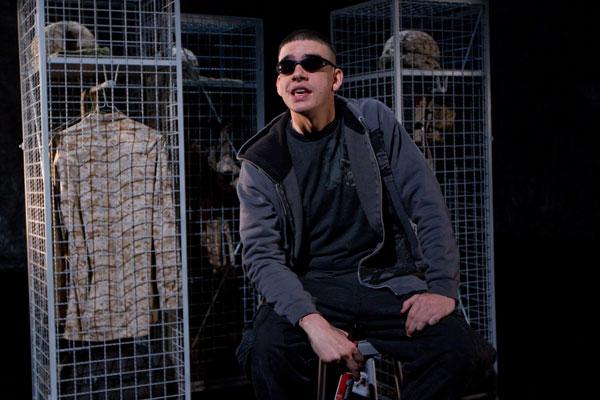
And last, NEFA provides separate funding to help you build your show for touring and to allow you to fashion your tour in ways that break, expand, and redefine the touring mold.|]
I’m guessing one of the reasons NEFA chose American Records was that we were committed to a rather big experiment: to pioneer how a show can tour, to create new touring networks, and to push the envelope of what a touring company could look like. No booking agent and no brick-and-mortar home (not even an office or rehearsal space to call our own), we were taking Do-It-Yourself to a whole new level. In the last five years, since our very first workshop when Emily and I had only a handful of scenes, the show has had only two casts, and with few exceptions, the design team has been with me all the way. Marion Williams (set and costumes), was on board well before Emily and I even had a single scene written. Our stage manager, Denise Cardarelli, became our tour coordinator, our sound designer, Zach Williamson, became the production manager, and I booked all our gigs. Three years later and a tour that spanned the country, went on to tour Germany and Italy, and included a contract with the Department of Defense, we’ve learned a few things about touring that I thought might be helpful to share:
1. Flexibility Is Everything. I didn’t want cost or venue requirements to limit where ReEntry could go. I wanted a great looking show that any major theatre or university would be proud to present, but it was equally important to me to be able to take ReEntry to military bases, hospitals, and events. So we devised three versions of ReEntry: an Alpha, a Beta, and a Charlie. Three shows with three different price points. The Alpha is the full package that ran at Actors Theater of Louisville, Roundhouse, Dartmouth, etc. The Beta version loads in in under an hour and techs in half an hour. We roll in with one road case that has our computer with video and sound pre-teched and we simply plug-and-play. Any space that can handle a PowerPoint presentation can handle our Beta design—allowing us to perform at places like the lecture hall at USMC Camp Pendleton’s School of Infantry. We can also re-tech our Charlie any time we like—I’m at home with AR’s computer linked remotely to Zach and Alex Koch (video designer), they make the changes we need, and I can watch the changes via my home projector. The Charlie version is five actors in costume, three stools, and a narrator. This is the version that we took to every VA hospital in the New York/New Jersey region. (BTW, according to the phonetic alphabet, Beta should actually be Bravo, but the change was intentional—in the tech world of course, Beta is the prototype and I thought that was appropriate)
2. You Need Big Brothers and Sisters. Three of my favorite companies—UNIVERSES, rainpan 43, and The Civilians do a great job touring, yet none of these companies have their own theatres/production shops. And for us, we didn’t even have our own office, much less our own shops. That’s where relationships with larger organizations come in. Our tour wouldn’t have been possible without some amazing “big brothers and sisters.” Two River gave us the original costumes and props at very little cost, friend of the show Arrianna Knapp of SenovvA provided me with budgeting mentorship and worked with our presenters to help meet the needs of our Alpha rider, and CENTERSTAGE built our touring set during the two off-season weeks when they would usually be shut down. This was beneficial to both of us—CS was able to keep their shop staff on salary and we were able to get a beautifully built set at a fraction of the cost.
And for us, we didn’t even have our own office, much less our own shops. That’s where relationships with larger organizations come in.
3. You Have to Help Your Presenters Know How to Talk about You. What did we do before the invention of Dropbox? Presenters are becoming more and more interested in auxiliary programming and outreach and yet have less time and money for marketing campaigns. In our Dropbox, presenters will find marketing artwork, press pull quotes, production photos, dramaturgical materials for programs, and a step-by-step “how to” for reaching military communities, which includes template letters to community leaders and even educational materials including a list of thoroughly vetted organizations where audience members can either seek or provide help for returning Veterans—makes for great lobby displays.
4. Cover Your Nut. The fee provided by your presenter needs to cover all of your costs. One of the reasons I chose to make American Records a corporation not a not-for-profit was because, aside from having full autonomy, it forced me to have true fiscal responsibility. I own American Records, and if it loses money, I lose money. Simple as that. I have no choice but to balance budgets. American Records doesn’t make a profit—I pay artists a decent figure, all are on union contracts (with full health contributions) so the money that comes in from fees goes straight to pay staff, artists, vendors, and future development, and there is no profit margin. This is why we can work under a fiscal sponsorship with Fractured Atlas, allowing us to receive tax-deductible donations and grants like NEFA.
Approximately 80% of our income is earned. And then we get by with just a little help from our friends. Yes, the military has a huge portion of the national budget, but that money’s not going for programs like ours—that’s for sure. So when I get a call from a military unit that has no money to bring us in and is having car washes to pay our fee (which actually happened) I give them a very low rate and then donations make up the difference.
Being a SCorp and working under fiscal sponsorship is not new, groups like UNIVERSES and rainpan and others have been pioneering this model for years. And for us—so far, so good. The financial pressure has not limited my creativity; it’s actually made me think in much more expansive ways about my work.
Here are the three biggest challenges we faced:
1. “It Isn’t Really Ours” Mentality. Some producers-turned-presenters, particular regional theatres, may shy away from tours because (understandably) they don’t want a relationship that’s just about busing in strangers. Solution: every tour stop can and should be a residency. For example: ATL decided to include our touring production in their main season. Many months before our arrival, I traveled to Louisville to host two Theater of War events. I worked closely with the education department as well as with marketing on outreach. And every single night, ATL staff and ReEntry’s actors had a town-hall style discussion with the audience post-performance. The connection between the ReEntry team and ATL felt just as strong as if we had built the show together.
2. Tours Are Expensive. Solution: Help the theatre raise money for your show. I’m not sure this is accurate, my statistics are purely anecdotal, but I’d say that a large portion of touring shows connect or relate to very specific communities. Those connections can be a great opportunity for a presenter to reach out to brand-new funding sources. Many of the theatres that presented us received sponsorships from companies and foundations that had never funded the arts. At each theatre, we’d brainstorm with development on funding sources, and many took me up on my offer to go anywhere any time to talk about the show with prospective donors. Granted, ReEntry is a special case, due to its subject, so this all may sound a bit naïve, I know.
3. Actors Equity Association Doesn’t Have a Contract that Fits How We Tour. I have no solution here. AEA reps are great and I’m very pro-union (not to mention a member of three), but right now the only AEA contract to tour on is the “Per Performance Contract,” which isn’t prohibitive, it just doesn’t fit light-and-lean companies like us. The problem isn’t AEA but rather the terms of the Pension and Health Fund (which is controlled by trustees, not AEA.) Here’s the short of it: if you tour, you might have dates that straddle a weekend. You may arrive on a Saturday, tech Sunday and Monday, perform Tuesday and Wednesday. So you worked five consecutive days, less than a full week. But because the PP contract defines a week as Monday to Sunday, you must pay two weeks of pension and health. And the biggest rub: P and H contributions are voluntary under this contract. This situation forces most companies’ hands, because who can afford to pay for two weeks when the work was for five consecutive days? This needs to change, but it is a change that can only be made by the P and H trustees. Any thoughts?
I love touring, and it has completely changed how I make a show. I’m now thinking about how the work will speak to communities around the country, how it will hold up with time, what forms it can take, and where the lines are between the play, auxiliary events, and the communities they are for—and how blurry we can make those lines.
Next on tap for American Records is the NFL (a logical place to go after Marines, right?). I’ll be interviewing football players and delving into the balance between the love of the sport and its inherent dangers, regarding head injuries and encephalopathy. So I conclude with the very first question that started the whole ReEntry journey: “If you know anyone I should interview, let me know.”


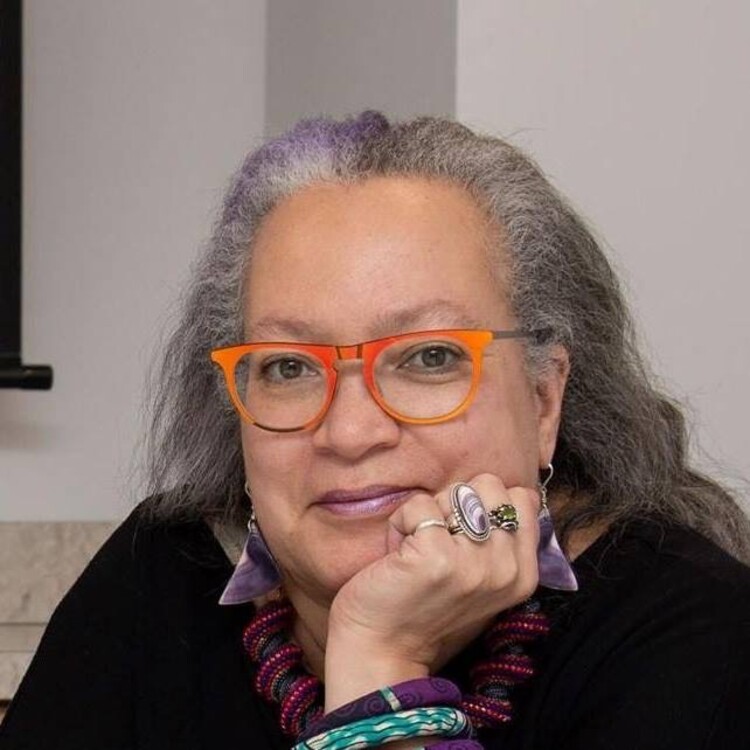
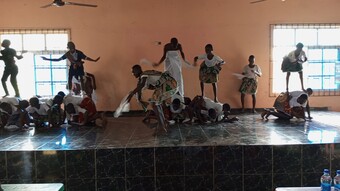


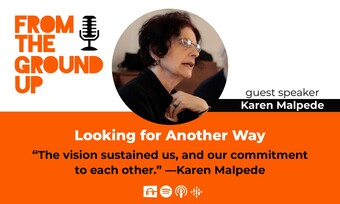


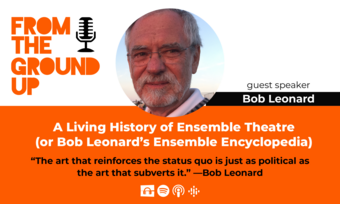

Comments
The article is just the start of the conversation—we want to know what you think about this subject, too! HowlRound is a space for knowledge-sharing, and we welcome spirited, thoughtful, and on-topic dialogue. Find our full comments policy here
Reading this from London. The can-do spirit and open offers of help to your colleagues has brought a very genuine tear to my eye. Did you bring the show to the UK?
I adored ReEntry when I read it. Pitched it to the administration at our college, which sits cheek by jowl with Camp Lejeune, the largest USMC base on the East Coast. Administration responded that it wasn't happy enough, brought up too much difficulty for Marines (despite several decorated vets supporting my pitch). Glad to see it is healthy elsewhere.
Yup. You are indeed leading by example. And when it comes to the conversation about engagement, on so many levels, you are a case study. Thanks, KJ, for the work and for the great writing about it.
brilliant and inspiring -- like the show which I so enjoyed with my students last season (having regretted missing it earlier at Center Stage). May it inspire many more of us!
Great post - loved the breakdown of how and why you do what you do!
Thanks, KJ. I really appreciate the amount of details you've included here, and your general strategy. A lot of food for thought.